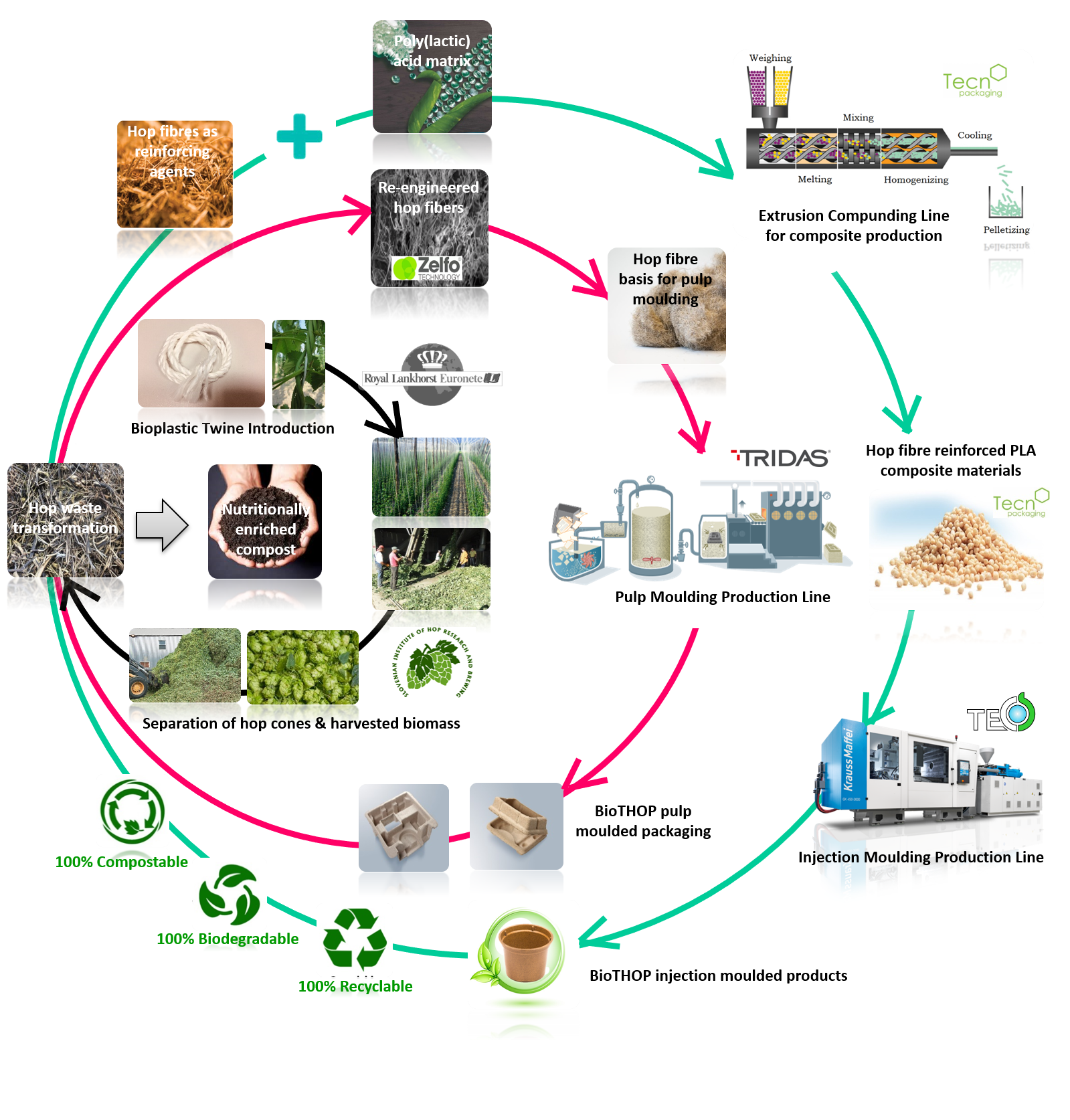On the European level, there are 50.000 tonnes of hops produced on a surface of 26.500 ha. Slovenia produces nearly 2.800 tonnes on 1.590 ha annually and is currently ranked as the 3rd EU’s largest hop producer, and the 5th in the world. The hop agricultural sector is the largest exporter in agricultural segment in Slovenia, therefore it also has a great meaning for Slovenia’s international visibility.
During the hop harvest, the entire above-ground mass of plants is removed from the field, and after the cones are harvested, the rest of the biomass (leaves and vines) are left behind. They are a valuable source of organic matter and nutrients for returning to agricultural areas. However, the problem is a synthetic polypropylene twine (PP), which is used as a support for hop plants during growth, as it remains intertwined in hop biomass after harvest and does not decompose by composting, thus preventing the use of this biomass as raw material and at the same time poses an environmental problem.
The aim of the this project is to replace the PP twine on the hop fields with the biotwine made of renewable material polylactic acid (PLA), that can be degraded by composting to simple monomers (H20, CO2 and biomass). Hop plant biomass after harvest can be used as main ingredient of composting and afterwards used as a natural fertiliser or material to produce biodegradable products (bio-composites, planting pots, and bottle packaging). Therefore, the agro-waste can be drastically reduced and the economy of the sold agro-waste to bioplastic producers can be increased. The demo region, which is Lower Savinja valley in Slovenia, will be an example of good practice for all hop-growing regions not only in EU but also across the world. The project will also benefit in socio-economic value as it can improve the green or so called eco-tourism.
The goal is to follow the circular economy and resource efficiency and to completely upcycle the hop waste in hop production and to improve energetic efficiency by 25 % by using the biopolymeric composites. Considering the emission of the greenhouse gasses there should be a great reduction compared to conventional plastic production.

Circular Economy Model of the LIFE BioTHOP Project
This project is cofounded by the Life Programme (Grant Agreement No. LIFE18 ENV/SI/000056) in the amount of 1,055,945.00 €, Slovenian Ministry for Environment and Spatial Planning, Municipalities: Žalec, Vransko, Polzela, Braslovče, Tabor, Prebold) and Association of Slovenian Hop Growers. The total budget of the project is 1,919,901.00 €.
Graphical presentation contains figures adopted and modified from the following websites: www.thermofisher.com; www.kraussmaffei.com; www.tradersherald.com; www.storaenso.com; www.newatlas.com; www.busscorp.com
The concept and graphical presentation prepared by Vesna Žepič Bogataj (TECOS).
BioTHOP Consortium forms a transnational partnership, comprised of 7 partners from 5 EU Member States: Slovenia, Portugal, Spain, Germany and Czech Republic. Slovenian Institute of Hop Research and Brewing, acting as Coordinating Beneficiary, runs its principal functions on research, advisory services and green managing procurements for sustainable hop-growing industry. Portuguese Lankhorst Euronete Group, in charge of development of home compostable PLA twine for hop-growing sector. German Zelfo Technology will develop a technology to reengineer hop waste fibers to be usable in fiber pulp moulding applications and extrusion compounding transforming processes. TRIDAS from Czech Republic will take the lead of the piloting action on hop-waste fiber transformation into pulp moulded packaging products. Spanish Tecnopackaging will lead the development and production of hop fiber PLA compounds for injection piloting and replication on extrusion blow moulding for the production of films from BioTHOP materials. Tecnopackaging’s prepared materials will be used by Slovenian company TECOS to perform an action on injection moulding of plating pots for horticulture, in particular for hop seedlings cultivated by IHPS. The 3rd Slovenian partner is Development Agency Savinja that unites 6 municipalities of Lower Savinja Valley, demo region of the project and the largest hop-growing region of Slovenia. Their presence will stimulate the active hop-growers involvement, disseminate, exploit and transfer the project results regionally and transnationally.
